#CivilRights
Photo

On March 2, 1955, Claudette Colvin refused to give up her seat to a white woman on a city bus in Montgomery, Alabama.
As police officers dragged her from the bus, she shouted again, and again, “It’s my constitutional right.” She was jailed and charged with violating segregation laws, disturbing the peace and assaulting a police officer. She pleaded not guilty, but was convicted.
Colvin’s act of protest happened 9 months before Rosa Parks famously sparked the Montgomery Bus Boycotts, but Colvin’s age and lack of experience in the civil rights movement rendered her act of bravery and defiance all but forgotten in the telling of civil-rights history.
𝗪𝗲 𝗰𝗮𝗻𝗻𝗼𝘁 𝗹𝗶𝘃𝗲 𝘂𝗽 𝘁𝗼 𝗼𝘂𝗿 𝗴𝗿𝗲𝗮𝘁𝗲𝘀𝘁 𝗶𝗱𝗲𝗮𝗹𝘀 𝘄𝗶𝘁𝗵𝗼𝘂𝘁 𝗰𝗼𝗻𝗳𝗿𝗼𝗻𝘁𝗶𝗻𝗴 𝘁𝗵𝗲 𝗿𝗲𝗮𝗹𝗶𝘁𝗶𝗲𝘀 𝗼𝗳 𝗼𝘂𝗿 𝗵𝗶𝘀𝘁𝗼𝗿𝘆.
#BlackHistory#BlackHistoryIsAmericanHistory#BlackHistoryMatters#CivilRights#civilrightsmovement#montgomerybusboycott#MontgomeryAlabama
1K notes
·
View notes
Text
Her Walk - Fannie Lou Hamer
The civil rights movement of the 20th century was led by a number of prominent figures such as Martin Luther King Jr., Malcolm X, and Rosa Parks. While these leaders are well-known and celebrated for their contributions to the movement, there were also many less well-known or prominent leaders who played critical roles in the fight for racial equality.
One such leader is Fannie Lou Hamer. Born in Mississippi in 1917, Hamer was a civil rights activist and leader in the Mississippi Freedom Democratic Party (MFDP). She was a fierce advocate for voting rights, and her efforts led to the integration of the Mississippi Democratic Party in 1964.

Hamer was also known for her powerful speeches, including her testimony at the Democratic National Convention in 1964, where she spoke out against the exclusion of MFDP delegates and the continued discrimination against African Americans in the South.
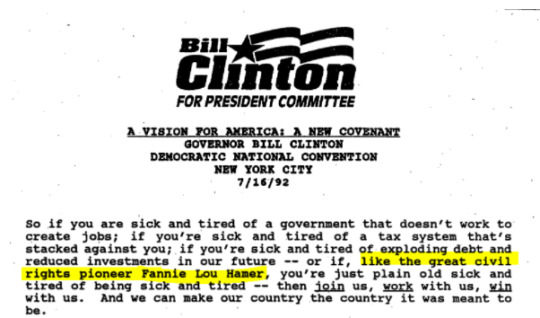
Remarks of Fannie Lou Hamer at the Democratic National Convention
Walk with Me: A Biography of Civil Rights Leader Fannie Lou Hamer
95 notes
·
View notes
Text
March for Jobs and Freedom, On This Day in 1963
#OnThisDay Martin Luther King Jr. gave his “I Have a Dream” Speech in 1963 at the March for Jobs and Freedom in Washington D.C. to thousands of union members.
Lost to history is the emphasis on the March for the fight for jobs that paid a living wage and the role of the labor movement in organizing this massive demonstration.


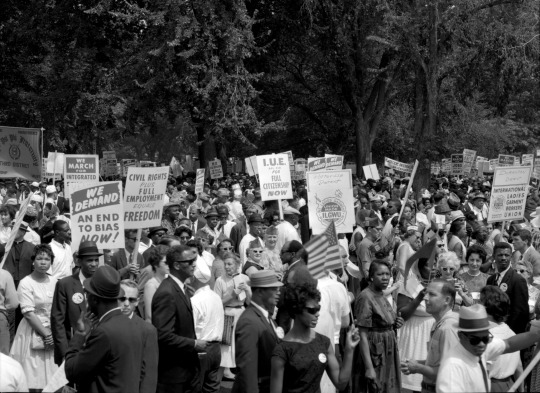


Images above depict members of the International Ladies’ Garment Worker Union (ILGWU) packing Pennsylvania Station in New York City, standing in front of the Lincoln Memorial, heading on buses to Washington D.C., and marching through the capitol with ILGWU signs.
#DrKing#MartinLutherKingJr#MLK#MarchOnWashington#MarchForJobsAndFreedom#IHaveADream#KheelCenter#ILR#Cornell#ArchivesLife#LaborArchives#LaborHistory#Labor#Unions#LaborMovement#CivilRights#FromTheArchives#HIstory#Strike#ThisDayInHistory#OTD
22 notes
·
View notes
Text

March for Jobs, Peace, and Freedom, Washington DC 1983
20 notes
·
View notes
Text
Celebrating black history month 2024
I decided to start out using very simple prompts. Today's prompt is
"Celebrating Black history month 2024 in _____ style. The styles I played with were, Afrofuturism, comic book, Steampunk, Impressionism.
I did it using both Dalle3 and Midjourney


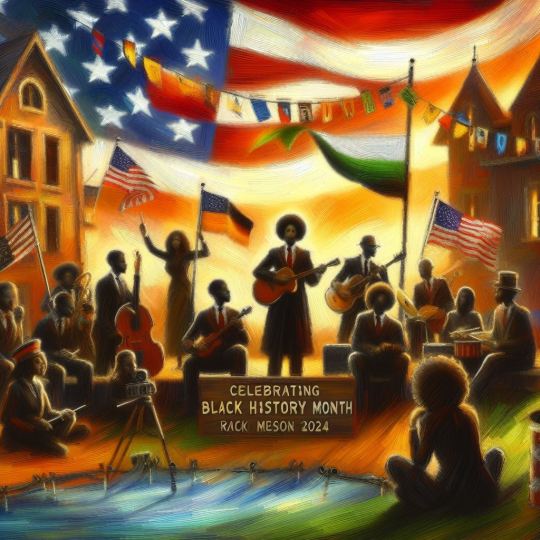
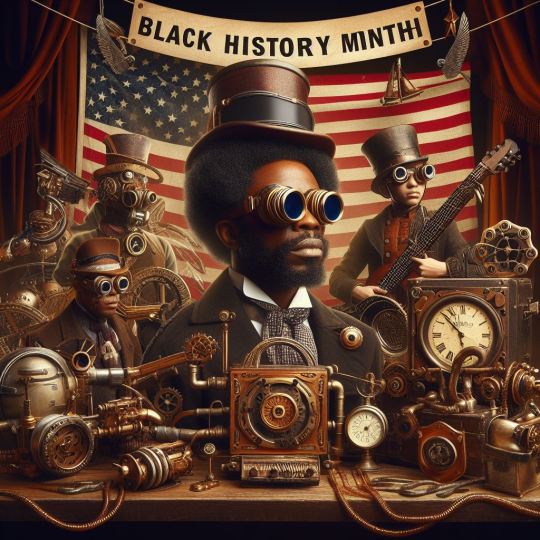
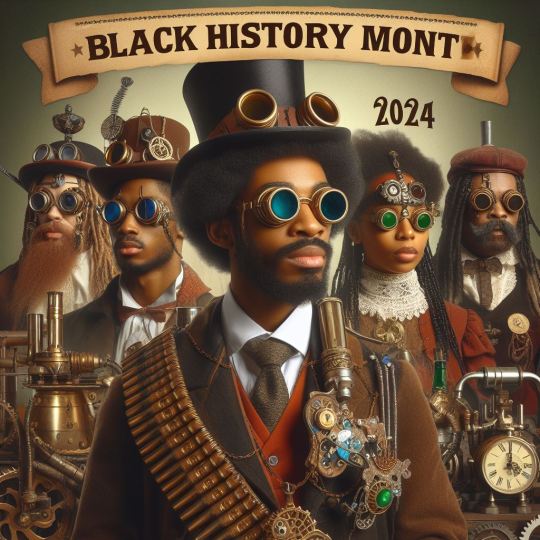


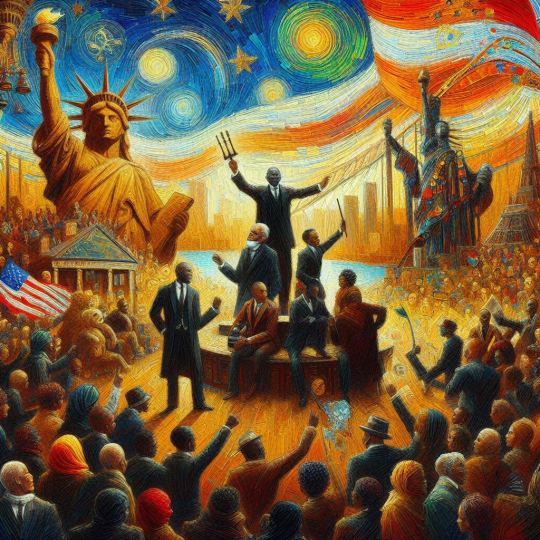

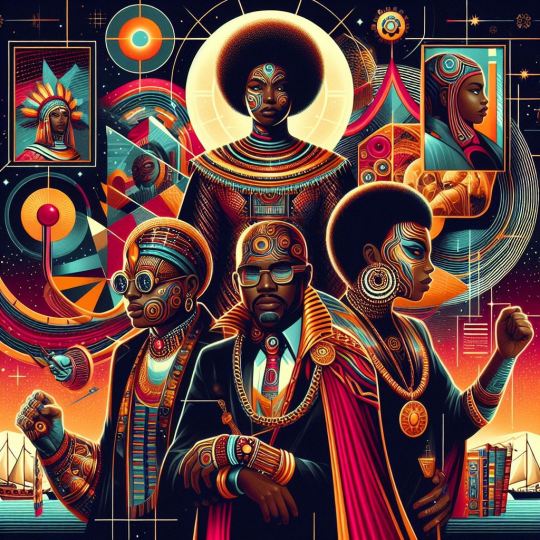




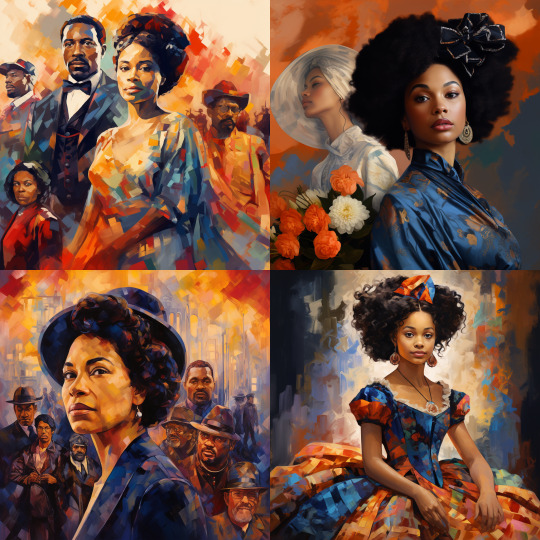

#blackhistorymonth2024#black history month#dalle3#midjourney#blackhistorymonth#civilrights#chatgpt#africanamericanhistory#justice#equality#afrofuturism#comic art#ai artwork#steampunk#impressionism
5 notes
·
View notes
Text

🎶 𝗩𝗼𝗶𝘅 𝗲́𝗰𝗹𝗶𝗽𝘀𝗲́𝗲𝘀 - 𝗔̀ 𝗹𝗮 𝗿𝗲𝗻𝗰𝗼𝗻𝘁𝗿𝗲 𝗱𝗲𝘀 𝗺𝘂𝘀𝗶𝗰𝗶𝗲𝗻𝗻𝗲𝘀 𝗺𝗲́𝗰𝗼𝗻𝗻𝘂𝗲𝘀 𝗱𝗲 𝗹'𝗵𝗶𝘀𝘁𝗼𝗶𝗿𝗲 🎵
🎹 𝗔𝘂𝗷𝗼𝘂𝗿𝗱’𝗵𝘂𝗶 : 𝗕𝗲𝘀𝘀𝗶𝗲 𝗝𝗼𝗻𝗲𝘀 (𝟭𝟵𝟬𝟮-𝟭𝟵𝟴𝟰) 🌱
Sous le ciel géorgien du siècle dernier, Bessie Jones, héritière des chants d'esclaves, se fit gardienne des psaumes de liberté, alors que l'Amérique oscillait entre prohibition et libération. Élevée au rythme des negro spirituals de son grand-père, elle sut dès l'enfance que chaque mélodie raconte une histoire, que chaque parole chante une mémoire. Le destin la fit mère et veuve prématurément, sculptant sa force et sa résilience. Sur les rivages de Saint-Simon, elle tissa des liens avec la Spiritual Singers Society, et plus tard, avec les Georgia Sea Island Singers, elle devint messagère des îles, éclaireuse culturelle, semant les graines des traditions afro-américaines. Sa voix, telle une passerelle entre passé et présent, s'élevait, défiant le silence imposé à ses ancêtres. Elle traversa les États-Unis, son art en étendard, prêchant par l'exemple que la musique est un pont vers l'égalité. Compagne de lutte de Martin Luther King, elle marcha, chantant pour l'espérance. Bessie, par ses gospels, fit plus que divertir ; elle réveilla les consciences. Son livre « Step It Down », et ses albums, sont les témoignages de sa vie. En mourant, Bessie Jones léguait au monde bien plus que des mélodies, elle offrait un héritage de résilience, un chant éternel de justice et d'unité.
🔗 Pour en savoir plus : https://fr.wikipedia.org/wiki/Bessie_Jones
🎧 Écouter : https://youtu.be/AfbiIZ_Kh34?si=i5CgX1D4uUvtfo_e
📸 Photo : Bessie Jones chez elle en 1975.
#BessieJones#Gospel#FolkMusic#CulturalHeritage#GeorgiaSeaIslandSingers#CivilRights#HistoireDeLaMusique#FemmesDansLaMusique
6 notes
·
View notes
Text
petition: A Native American Child Grew Out His Hair to Honor His Heritage. His School Told Him to Cut It or He Would Be Suspended.
This sounds like what they did at the boarding schools.
6 notes
·
View notes
Text

Black Americans fought for equality long before the Civil Rights Movement of the 1960s. In 1884, while Jim Crow was in its infancy, a group of black Baltimoreans purchased first-class tickets to board the Steamer Sue, which plied the waters between Maryland and Virginia. About an hour into the voyage, the ship’s chambermaid informed the group that the captain would not permit them to occupy the first class cabin because the ship’s regulations prohibited African Americans from that part of the vessel. The travelers protested their treatment by staying up all night in the ship’s saloon. When the women returned to Baltimore they filed a lawsuit against the Baltimore, Chesapeake, and Richmond Steamboat Company.
You can learn more about this case, and how researcher Dr. Dennis Patrick Halpin unraveled the story, by checking out his guest post on NARA's Rediscovering Black History blog: https://rediscovering-black-history.blogs.archives.gov/2018/12/18/early-civil-rights-protest-and-the-steamer-sue-case/
Pictured: Scan of the Rules and Regulations of the Baltimore, Chesapeake & Richmond Steamboat Company, which was submitted with the Stenographer’s Record in the case file.
#black history#black history month#bhm#nara#archives#history#maryland#baltimore#protests#civilrights
25 notes
·
View notes
Photo
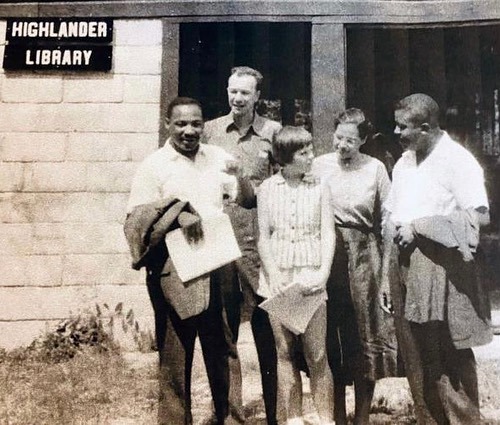
Founded 90 years ago in 1932, and still in operation today, the Highland Research and Education Center in New Market, TN is a training center for labor and #civilrights activists, with students like Martin Luther King Jr, Rosa Parks, Ralph Abernathy & Pete Seeger (pictured with Charis Horton). The Gospel song "We Shall Overcome" became the school's anthem, which spread among the activists in training. #americanhistory🇺🇸 #civilrightshistory #blackhistory #goodblacknewscalendar https://www.instagram.com/p/Ck82wh3Pluu/?igshid=NGJjMDIxMWI=
43 notes
·
View notes
Text
Dive into the intriguing stories, enduring influences, and contrasting ideologies of Dr. Martin Luther King Jr. and Malcolm X (#Bi2) through the exciting new series, "Genius MLK/X." Driven by Dr. King's visionary guidance, the U.S. Civil Rights Movement made significant strides towards achieving racial equality by employing nonviolent protests and advocating for legislative change. In stark contrast, Malcolm X frequently critiqued Dr. King's civic-oriented strategies, vigorously advocating for black empowerment, identity, and the pursuit of self-determination. 💜
#malcom x#dr. martin luther king jr.#black empowerment#civilrights#determination#blackhistorymonth#history#identity#new series#racial equality
3 notes
·
View notes
Photo
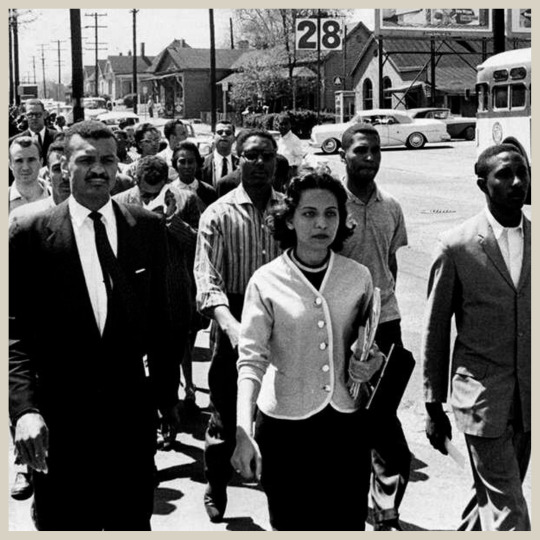
On this day in 1938, Civil Rights Activist Diane Nash (May 15, 1938—) was born in Chicago, Illinois.
Nash was prominently involved in some of the most consequential campaigns of the civil rights movement. She was a leader during the sit-in movement to desegregate lunch counters in Nashville, Tennessee, and was among the founding members of the SNCC.
78 notes
·
View notes
Text
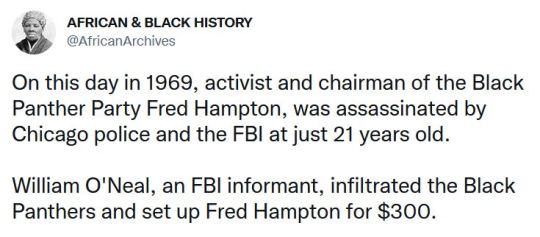
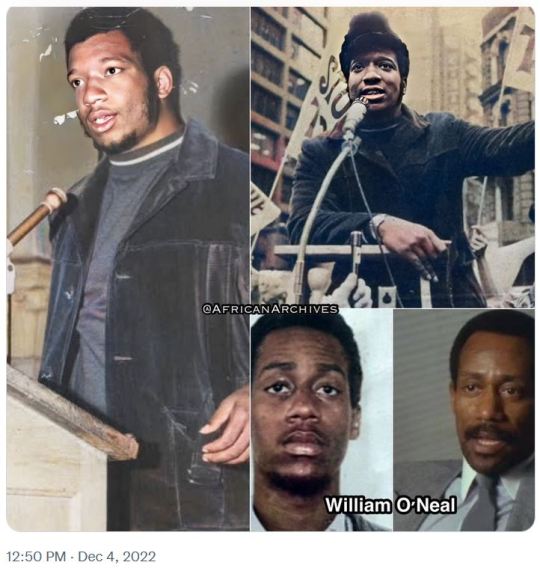




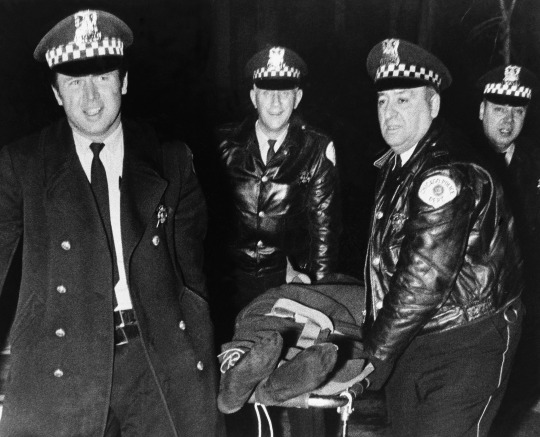



Fred Hampton
Born: August 30, 1948,
Assassinated: December 4, 1969, Chicago,IL
#fred hampton#chairman fred#blackpantherparty#william o'neal#sometimes it be your own people#judas and the black messiah#black activism#blacktivism#belovedcommunity#revolution#blackexcellence#blackconsciousness#racism#chicago#blacklivesmatter#blackpeople#the black experience#civilrights#theblacknarrative#panafrican#afrocentrism#rootingforeverybodyblack#allblackeverything#fortheculture#blackculture#blackhistory#blackpositivity#blackpride#blackpower#blacktumblr
201 notes
·
View notes
Text
How is this us supporting democracy:
Since Janna was born there has not been a single general or presidential election in the Palestinian territories. The last one took place in 2006, which means anyone under 34 years old has never had the opportunity to vote.
#palestine#israeli apartheid#palestinians#israeli occupation#illegal settlements#free palestine#youth#right to vote#democracy#elections#free and fair elections#civilrights#humanrights#electoralism#usa#future generations#young generation
16 notes
·
View notes
Text

#trieyemedia#memphis#martin luther king jr#mlk day#downtown#civilrightsmovement#civilrights#human rights
4 notes
·
View notes
Text
Reminder for Every American The 27 Amendments
In the rich history of the United States Constitution, the 27 amendments stand as crucial pillars that shape the nation's principles and protect the rights of its citizens.
As Americans, it is imperative you never forget these amendments, as they form the bedrock of our democracy. Let's delve into each amendment and understand why they are essential to uphold.
First Amendment - Freedom of Speech, Religion, and the Press: The First Amendment guarantees the fundamental rights of freedom of speech, religion, and the press. Americans should cherish this amendment as a cornerstone of democracy, allowing diverse voices to be heard and ideas to flourish.
Second Amendment - Right to Bear Arms: While the Second Amendment ensures the right to bear arms, responsible gun ownership is crucial. Americans must be mindful of the balance between individual rights and public safety.
Third Amendment - Quartering of Soldiers: The Third Amendment, often overlooked, prohibits the quartering of soldiers in private homes during peacetime. This protects citizens' privacy and underscores the principle of civilian control over the military.
Fourth Amendment - Search and Seizure: Guarding against unreasonable searches and seizures, the Fourth Amendment is a safeguard against unwarranted government intrusion. Americans must be vigilant in defending their right to privacy.
Fifth Amendment - Rights of the Accused: The Fifth Amendment protects the rights of the accused, ensuring due process, protection against self-incrimination, and the right to fair compensation for seized property. It stands as a shield against potential government abuse.
Sixth Amendment - Right to a Fair Trial: The right to a speedy and public trial, impartial jury, and legal representation is enshrined in the Sixth Amendment. Americans should demand a fair judicial system that upholds justice for all.
Seventh Amendment - Right to a Jury Trial in Civil Cases: In civil cases, the Seventh Amendment guarantees the right to a jury trial. This reinforces the democratic principle that citizens, not just judges, play a role in dispensing justice.
Eighth Amendment - Cruel and Unusual Punishment: The Eighth Amendment prohibits cruel and unusual punishment, emphasizing the nation's commitment to humane treatment even of those convicted of crimes.
Ninth Amendment - Rights Retained by the People: The Ninth Amendment reminds Americans that their rights extend beyond those explicitly stated in the Constitution. It safeguards individual liberties not enumerated, stressing the breadth of personal freedoms.
Tenth Amendment - Powers Reserved to the States: Highlighting the principle of federalism, the Tenth Amendment reserves powers not delegated to the federal government to the states or the people. Americans should appreciate the balance between national and state authority.
Eleventh Amendment - Immunity of States from Certain Lawsuits: The Eleventh Amendment shields states from certain lawsuits, emphasizing the sovereignty of states in specific legal matters. This reinforces the delicate balance between federal and state authority.
Twelfth Amendment - Procedure for Electing the President and Vice President: The Twelfth Amendment outlines the electoral process for choosing the President and Vice President. Americans should understand the intricacies of this process, which ensures a smooth transition of power.
Thirteenth Amendment - Abolition of Slavery: Arguably one of the most pivotal amendments, the Thirteenth Amendment abolished slavery. Americans should never forget the historic significance of this amendment, celebrating the triumph over one of the darkest chapters in the nation's history.
Fourteenth Amendment - Equal Protection Under the Law: The Fourteenth Amendment is a cornerstone of civil rights, guaranteeing equal protection under the law. Americans must actively strive for a society that upholds this principle for all its citizens.
Fifteenth Amendment - Right to Vote Regardless of Race: The Fifteenth Amendment prohibits the denial of voting rights based on race. It is a reminder of the ongoing struggle for universal suffrage and the importance of protecting voting rights for all.
Sixteenth Amendment - Income Tax: The Sixteenth Amendment grants Congress the power to levy income taxes. Understanding the role of taxes in funding essential government functions is crucial for all Americans.
Seventeenth Amendment - Direct Election of Senators: Prior to the Seventeenth Amendment, state legislatures appointed U.S. Senators. This amendment changed the process to direct election by the people, reinforcing the democratic principle of citizens' direct involvement in governance.
Eighteenth Amendment - Prohibition of Alcohol: The Eighteenth Amendment, prohibiting the manufacture, sale, and transportation of alcohol, was later repealed by the Twenty-First Amendment. This episode in American history highlights the importance of carefully considering the implications of legislative decisions.
Nineteenth Amendment - Women's Right to Vote: The Nineteenth Amendment granted women the right to vote, marking a significant milestone in the quest for gender equality. Americans must honor the struggles of those who fought for this fundamental right.
Twentieth Amendment - Terms of the President and Congress: The Twentieth Amendment sets the dates for the inauguration of the President and Congress, ensuring a smooth transition of power and efficient governance.
Twenty-First Amendment - Repeal of Prohibition: The Twenty-First Amendment repealed the Eighteenth Amendment, ending the era of prohibition. It serves as a reminder of the importance of revisiting and rectifying laws that may prove impractical or counterproductive.
Twenty-Second Amendment - Limitation on Presidential Terms: The Twenty-Second Amendment imposes term limits on the presidency, preventing individuals from holding the office for more than two terms. This ensures a rotation of leadership and guards against potential abuses of power.
Twenty-Third Amendment - Right to Vote for Residents of Washington, D.C.: Granting residents of Washington, D.C., the right to vote in presidential elections, the Twenty-Third Amendment reinforces the democratic principle of representation for all citizens.
Twenty-Fourth Amendment - Prohibition of Poll Taxes: The Twenty-Fourth Amendment prohibits poll taxes in federal elections, ensuring that financial barriers do not impede citizens' right to vote. Americans should be vigilant against any attempts to restrict voting through discriminatory means.
Twenty-Fifth Amendment - Presidential Succession and Disability: The Twenty-Fifth Amendment outlines the procedures for presidential succession and the temporary transfer of power in case of a president's incapacity. Understanding this amendment is crucial for maintaining stability in government.
Twenty-Sixth Amendment - Right to Vote at Age 18: The Twenty-Sixth Amendment lowered the voting age to 18, recognizing the rights and responsibilities of young citizens. Americans should encourage civic engagement and participation among the youth.
Twenty-Seventh Amendment - Congressional Pay: The Twenty-Seventh Amendment addresses congressional pay, stating that any change in salary for members of Congress will only take effect after the next election. This amendment reflects the importance of transparency and accountability in government.
Americans, you must not only be aware of the 27 amendments but actively embrace and defend the principles they embody. These amendments represent the collective efforts to forge a more perfect union, securing individual freedoms, promoting equality, and establishing a government accountable to its citizens.
These amendments forward, ensuring that they remain an integral part of the nation's identity and guide your commitment to justice, liberty, and the pursuit of happiness.
#Constitution#Amendments#USHistory#CivilRights#Democracy#LegalRights#CivicEngagement#AmericanValues#IndividualFreedom#Equality#VotingRights#GovernmentAccountability#PoliticalEducation#Citizenship#ConstitutionalRights#HistoricalLegacy#PublicPolicy#RuleOfLaw#SocialJustice#DemocracyInAction
2 notes
·
View notes
Text
Black Lives Matter
I went simple again today with Black Lives Matter prompt. I thought I was going to get caught up in content filters but things went pretty smoothly. My favorite by far is "Black Lives Matter protest in Brooklyn Solarpunk style"

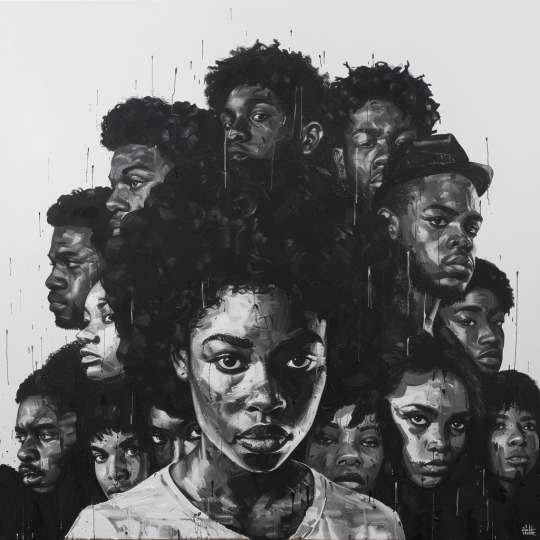

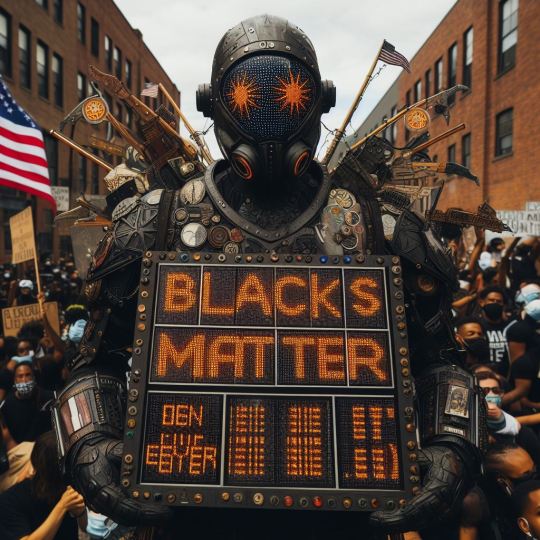



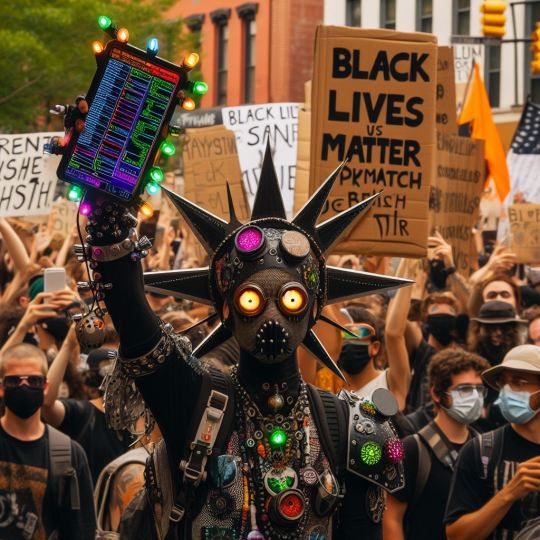
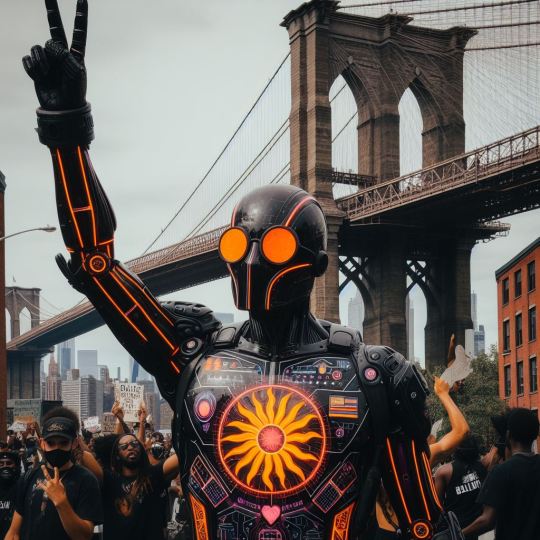
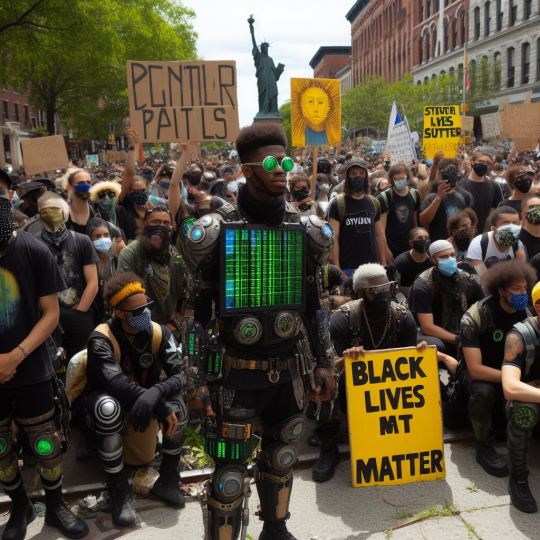



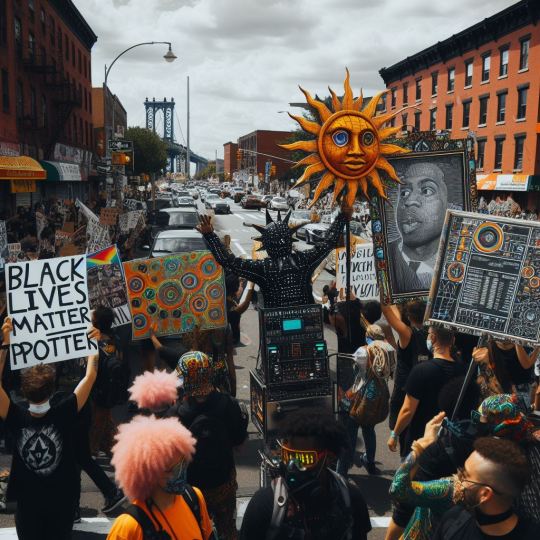

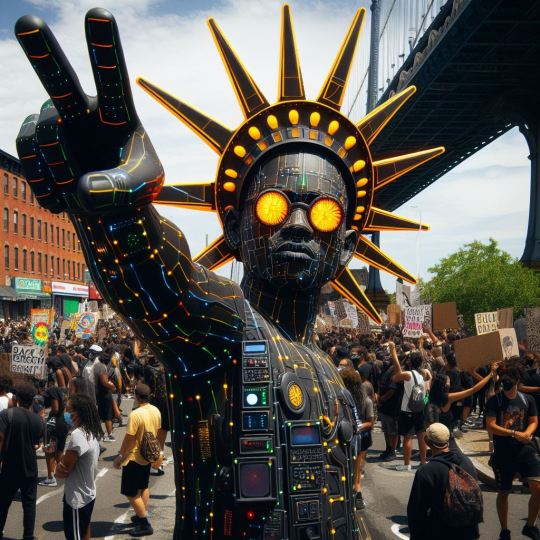
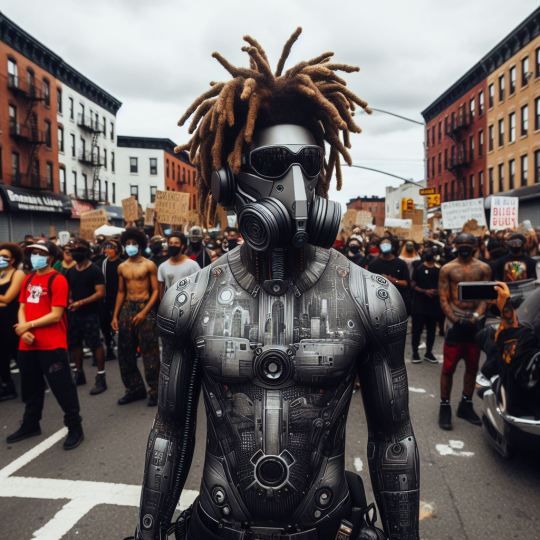




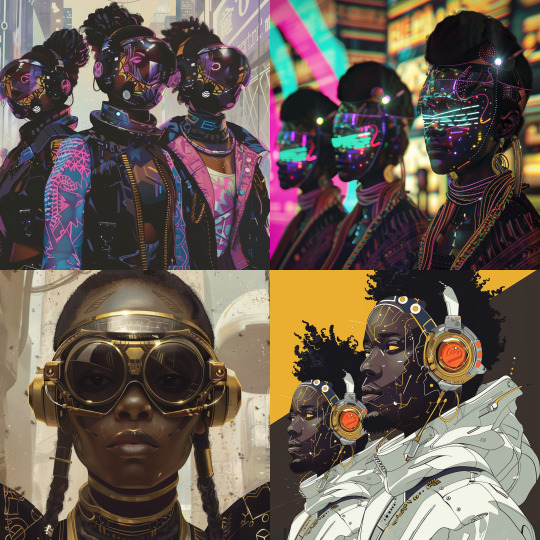




#black history month#africanamericanhistory#blackhistorymonth#equality#dalle3#midjourney#civilrights#justice#afrofuturism#solarpunk#black lives matter#blm#blackhistorymonth2024
4 notes
·
View notes